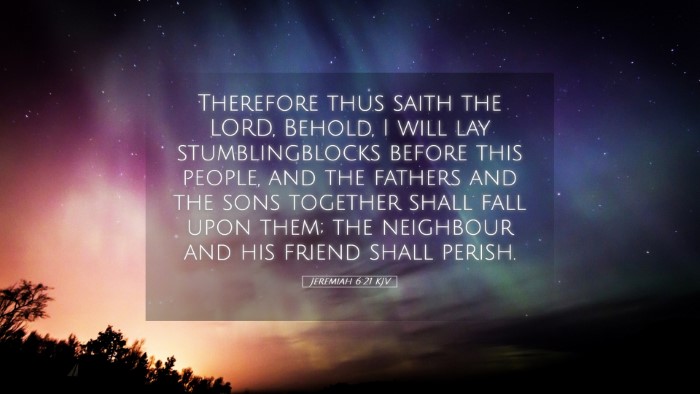Commentary on Jeremiah 6:21
Verse Text: "Therefore thus says the Lord: 'Behold, I will lay stumbling blocks before this people, and the fathers and the sons together shall stumble against them; neighbor and friend shall perish.'" (Jeremiah 6:21, ESV)
Overview
This verse highlights a profound warning from the Lord through the prophet Jeremiah regarding impending judgement and the consequences of disobedience. Jeremiah 6:21 serves as a pivotal moment, emphasizing the gravity of the situation faced by the people of Jerusalem. The message is directed to a community in moral decline, facing imminent disaster due to their rejection of God’s guidance.
Theological Insights
- Divine Judgment: The verse explicitly mentions "stumbling blocks," symbolizing the impending judgment that is both inevitable and unavoidable. God, in His righteousness, sets obstacles in the way of those who have turned from Him.
- Shared Consequence: The phrase "fathers and sons together shall stumble" conveys that the consequences of sin are collective. There is no distinction between generations; thus, the entire community bears the burden of their transgressions.
- Community and Relationships: The mention of "neighbor and friend shall perish" accentuates the communal nature of Israel's judgment. The fall of individuals affects the broader community, highlighting a relational theology where one's actions impact not only themselves but those around them.
Commentary from Public Domain Sources
Matthew Henry’s Commentary
Henry reflects on the spiritual state of Judah during Jeremiah's ministry. He notes that the "stumbling blocks" represent not just physical calamity but also spiritual confusion. Henry emphasizes that such divine interventions serve to awaken the people from their spiritual slumber, illustrating that judgement often accompanies profound mercy; the intention is to lead the people back to repentance.
Albert Barnes’ Notes on the Bible
Barnes elaborates on the metaphor of stumbling blocks, interpreting them as the various afflictions and trials that God will place before the disobedient. He stresses the thoroughness of God's judgment, indicating that all levels of society—both high and low—will experience these repercussions. Barnes notes the phrase "the fathers and the sons" illustrates the family unit and their shared destiny in facing judgment, pointing to the importance of each generation’s responsibility before God.
Adam Clarke’s Commentary
Clarke provides insight into the broader social and historical context of Jeremiah's message. He conjectures that the "neighbor and friend" aspect of the verse underscores the betrayal and loss of trust within the community as relationships deteriorate under moral and spiritual decline. Clarke’s analysis draws attention to the psychological impact of such a collapse, where personal relationships are affected by national sin, leading to collective turmoil.
Practical Applications
- Awareness of Sin: Pastors are encouraged to raise awareness of sin not just as a personal issue but as one that affects the community. This verse serves as a warning that individual sin can lead to communal consequences.
- Call to Repentance: The need for repentance is underscored in this scripture. It is a call for both leaders and laypersons to seek a return to God before facing inevitable consequences.
- Nurturing Relationships: Emphasizing the relational dynamics within communities, church leaders should strive to foster environments where accountability and support are paramount, thus aligning themselves with God's desire for communal integrity.
Conclusion
Jeremiah 6:21 serves as a solemn reminder of the seriousness of divine warnings and the vital importance of responding to them. The shared afflictions of the people underscore a collective responsibility, illustrating how personal and communal states of faith are intertwined. For theologians, students, and pastors, this verse invites deep contemplation on the nature of God's justice, the necessity of repentance, and the impact of individual actions on the broader community.


